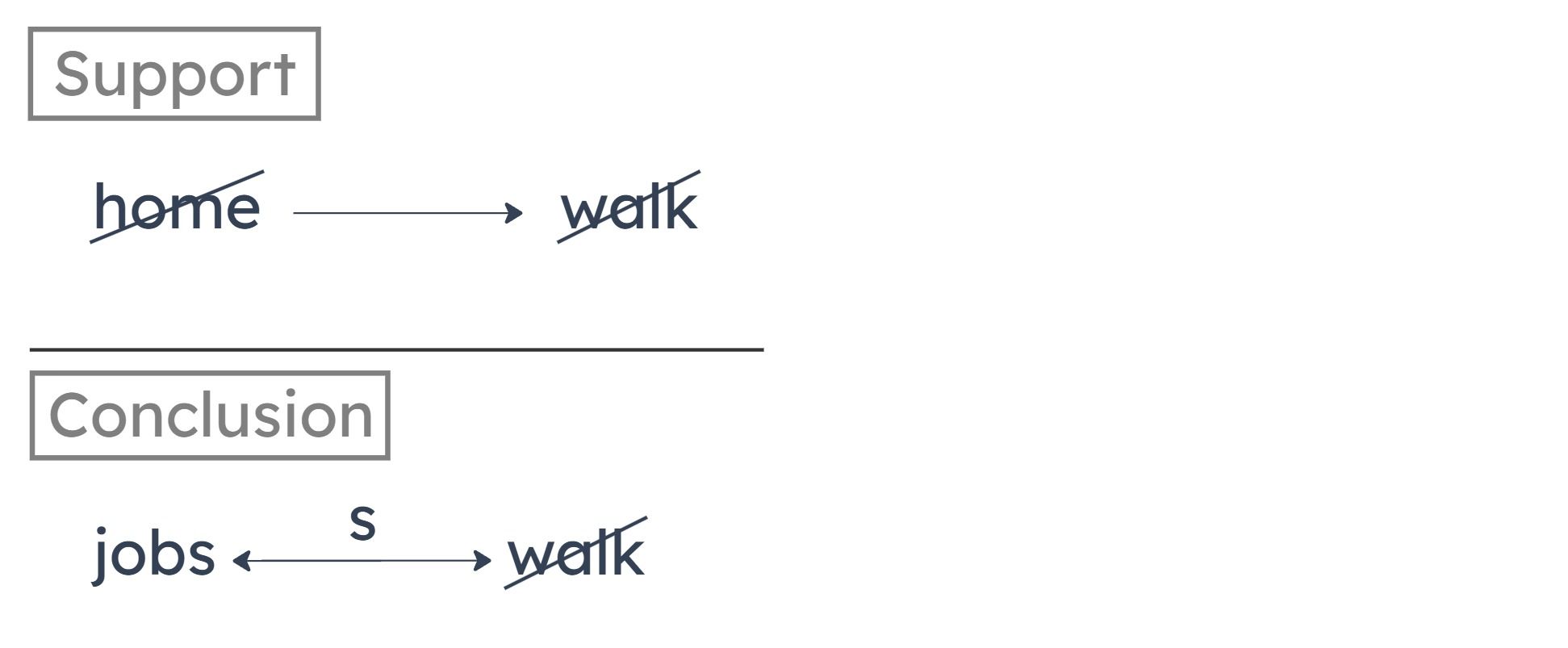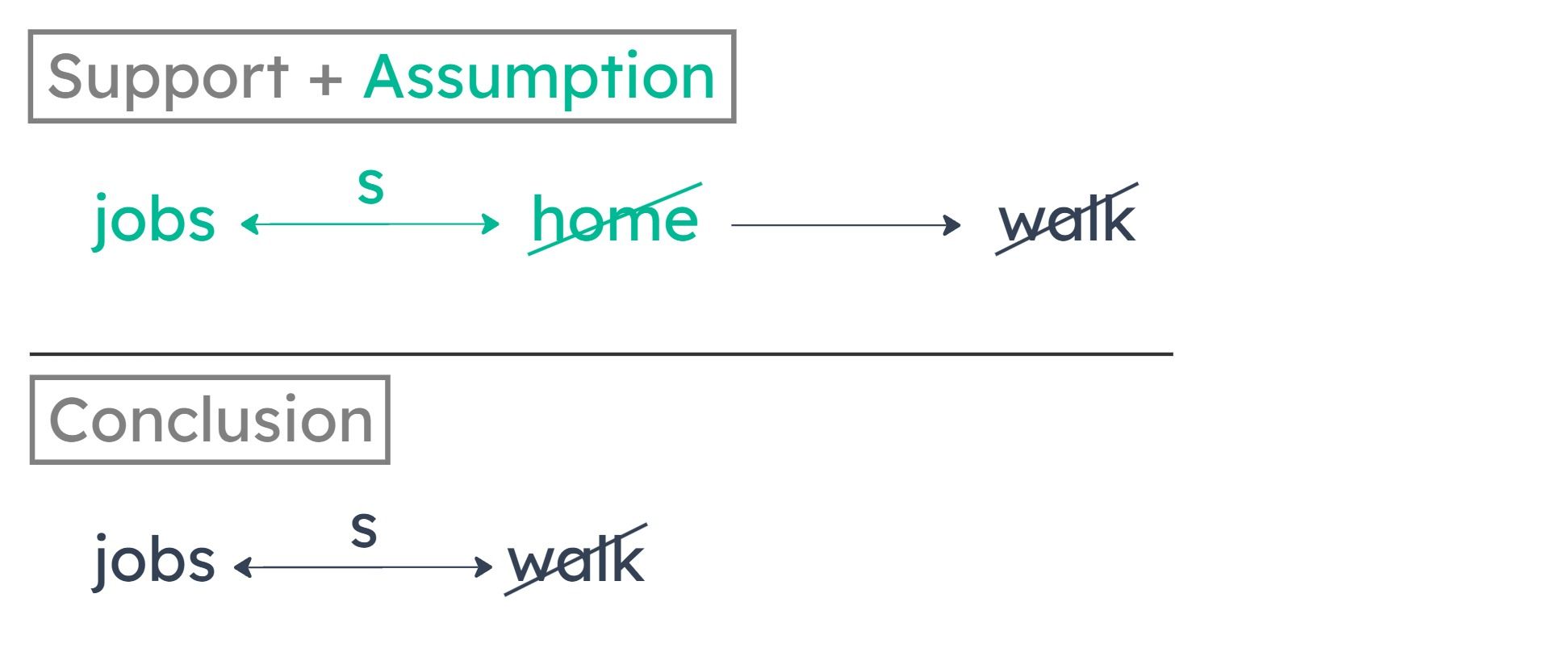Summary
The author concludes that some students with part-time jobs do not walk to school. His reasoning is that every student who walks to school goes home for lunch. Or, in contrapositive form, that all students who don’t go home for lunch don’t walk to school.


Missing Connection
The conclusion is about students with part-time jobs, but they aren’t mentioned in the premise. We need to bridge this gap to reach the conclusion that some students with part-time jobs do not walk to school.
By taking the contrapositive of the premise, we inferred that all students who don’t go home for lunch don’t walk to school. So, if at least some students with part-time jobs don’t go home for lunch, then some of them wouldn’t walk to school. This would guarantee the argument’s conclusion.
By taking the contrapositive of the premise, we inferred that all students who don’t go home for lunch don’t walk to school. So, if at least some students with part-time jobs don’t go home for lunch, then some of them wouldn’t walk to school. This would guarantee the argument’s conclusion.
A
Some students who do not have part-time jobs go home for lunch.
This can’t be correct, because it tells us about some students who don’t have part-time jobs. Our conclusion is about students who do have part-time jobs. A “some” statement’s contrapositive isn’t automatically valid. So this tells us nothing about students with part-time jobs.
B
Every student who goes home for lunch has a part-time job.
This doesn’t help us reach our conclusion, because all it lets us infer is that some students with part-time jobs go home for lunch. We want to conclude that some students with part-time jobs do not walk to school.
C
Some students who do not have part-time jobs do not go home for lunch.
This can’t be correct, because it tells us about some students who don’t have part-time jobs. Our conclusion is about students who do have part-time jobs. A “some” statement’s contrapositive isn’t automatically valid. So this tells us nothing about students with part-time jobs.
D
Some students who do not go home for lunch have part-time jobs.
Every student who doesn’t go home for lunch doesn’t walk to school. So, if some students with part-time jobs don’t go home for lunch, some students with part-time jobs don’t walk to school. Note that “some” is bidirectional: saying some As are Bs is equivalent to saying that some Bs are As.


E
Every student who goes home for lunch walks to school.
This doesn’t mention students with part-time jobs, so it can’t be correct. We need an answer that bridges the gap between the premise and the conclusion.
Summary
Poets preserve languages, because only poetry cannot be translated well. If we could get everything written in a translation, then we would not bother to learn a language. Therefore, since we cannot observe the beauty of poetry except in the language in which it is written, we have motivation to learn the language.
Strongly Supported Conclusions
We should note that, since this is an “except” question, any strongly supported conclusion would be an incorrect answer choice. We’re looking for an answer choice that is unsupported or least supported. Some strongly supported conclusions could include:
If we bother to learn a language, then there must be poetry in that language.
Preserving a language involves motivating at least some people to learn that language.
The desire to witness the beauty of poetry motivates at least some people to learn a language.
If we bother to learn a language, then there must be poetry in that language.
Preserving a language involves motivating at least some people to learn that language.
The desire to witness the beauty of poetry motivates at least some people to learn a language.
A
All nonpoetic literature can be translated well.
The stimulus concedes that any nonpoetic form of literature can be translated well. We are told only poetry cannot be translated well.
B
One purpose of writing poetry is to preserve the language in which it is written.
The stimulus does not provide any information regarding the purpose of writing poetry. We only know, rather, the consequences or results of writing poetry.
C
Some translations do not capture all that was expressed in the original language.
The stimulus concedes that some translations do not capture everything expressed in the original language. Our main example is poetry, and we know from the stimulus that only poetry cannot be translated well.
D
The beauty of poetry is not immediately accessible to people who do not understand the language in which the poetry was written.
The stimulus concedes that one cannot understand the beauty of poetry except in the language it is written in. If someone does not understand that language, the poetry’s beauty would not be immediately accessible.
E
Perfect translation from one language to another is sometimes impossible.
The stimulus concedes that sometimes perfect translation between languages is impossible. Our main example is poetry, and we know from the stimulus that only poetry cannot be translated well.